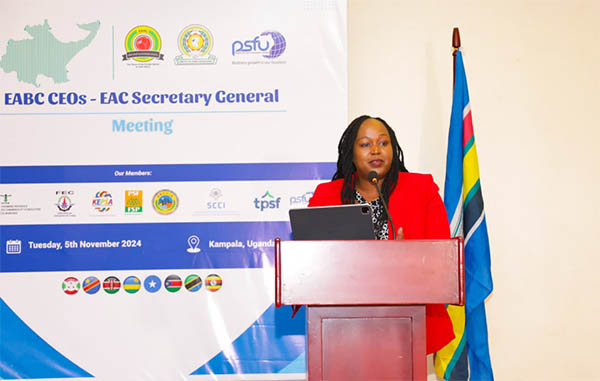
Kampala, Uganda | THE INDEPENDENT | There are fears that the factors and developments that led to the collapse of the first East African Community in the 1970s are increasingly evident in the current bloc.
While the first EAC existed for only 10 years, the revived version is marking 25 years this month, albeit amid challenges that the leaders are blaming on continued focus on national interests at the expense of integration.
Veronica Nduva, the EAC Secretary General told the EAC Secretary General’s Dialogue with the Private Sector in Uganda that the integration process would be successful without mixing politics with business, as is the case today. She advised that everyone should work towards unity in the region and avoid the repeat of the 70s.
The dialogue was also dominated by condemnation of the persistence of non-tariff barriers which have in turn stifled the growth of trade in the region.
Currently, trade among the eight partner states accounts for just 13 percent of the total within and with other regions, far below the other regions’ statistics.
The Secretary-General asserts that one of the main reasons for this is that countries are not open to trade with each other and use any opportunity to block imports from other countries, citing the example of Uganda’s maize and milk products.
She says that this will soon be overcome with the recognition of national standards across the EAC, as the harmonisation of standards continues.
📍Kampala, Uganda
1/3
☘️The @EABCjumuiya and Uganda’s Private Sector Foundation @PSF_Uganda held an interactive session with the EAC Secretary General @SGNduva to deliberate on tackling challenges hindering integration & explore new opportunities to boost trade & investment. pic.twitter.com/TKkhd7tMzm— East African Community (@jumuiya) November 5, 2024
Uganda’s Minister for East African Community Affairs, Rebecca Kadaga said the lasting solution to all these concerns would be a federation.
Unfortunately, she said, the process is too slow, giving the example of countries not concerned about organizing political national consultation on the federation process, with only four out of the eight having conducted them.
This, she admits, is because the different partner states only care for their national interests.
George Stephen Odongo, a Ugandan Member of the East African Legislative Assembly put all the blame on the political leadership of the countries that have different priorities from those of the private sector.
According to him, the EAC was established to be private sector-led, but the private sector has abrogated its mandate to the political leadership, adding that it was high time to reclaim it through their organisations.
Otherwise, he says, politics in integration is a risk to the progress done so far and the interests fronted in the policies are not the interest of the business community.
The private sector leaders also demanded that the governments as well as the EAC secretariat improve the pace at which they handle private-sector-related issues to ensure faster trade and growth of businesses.
Simon Kaheru, the Vice Chairman of the East African Business Council called for the implementation of the Buy East African, Build East African campaign and urged governments to embrace it so as to expand the regional market for the private sector.
The trade volumes amongst the East African Community Countries have grown to about 12.1 billion dollars in 2023 up from 10.6 billion the previous year, bringing this to between 13 and 15 percent of total trade.
Uganda’s exports to the region also grew to about 2.23 billion dollars, almost double the previous year.
Speaking about the intra-regional trade, Adrian Njau, the EABC Acting Executive Director, said there is still a need to review the objectives of the community and find solutions to increase trade, value addition and job-creation, as well as make the region Arica’s top investment destination.
*****
URN
 The Independent Uganda: You get the Truth we Pay the Price
The Independent Uganda: You get the Truth we Pay the Price



